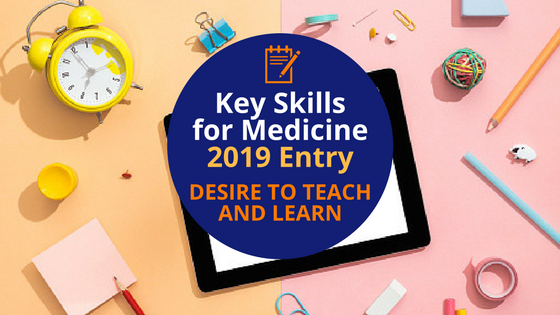
Welcome to our new blog series, Key Skills for Medicine for 2019 Entry! This series will explore different skills needed for medicine – from scientific interest to people skills – and how to demonstrate them easily.
This blog will focus on developing and demonstrating the desire to teach and learn.
Teaching and learning are both integral parts of a medical career. Medical schools would like to see that you have an interest in these from an early stage – being committed to learning and teaching others displays some of the key qualities needed to work as a doctor. In this blog, I will give you five easy ways you can show a desire to teach and learn.
Looking for medical work experience? Try our Tanzania 2018 programme with Gap Medics!
Find out more about Tanzania 20181. Additional projects undertaken
Many schools and colleges give you the opportunity to undertake an additional project such as an Extended Project Qualification (EPQ). Although it’s not a necessary requirement for entry to medicine, it is a great way to demonstrate a desire to learn more about the scientific or medical field.
Going out of your way to complete an additional project shows commitment and will be very much in your favour. It may also provide an interesting talking point for future interviews, which is great as it will be an area that you have learnt a lot about and will therefore be prepared for.
Learn how to get an A in your EPQ>>
2. Study groups
You may attend additional workshops to supplement your learning – this is a positive thing, because it shows that you take responsibility for your own education, and take initiative to improve your learning.
You may have even led study groups or revision workshops for peers or younger students, and this would also be fantastic to write about. Teaching is a huge part of medicine and showing a readiness to be involved in this from an early stage will reflect well on you.
3. Extracurricular science trips/activities
Try to take note of any extracurricular trips or activities you take part in and reflect on what you learnt and achieved. Schools and colleges are usually very good at involving prospective medics in such things, and it’s a great opportunity to show that you are interested in learning about topics wider than your A-Levels.
Examples might include lectures attended at universities, trips to science laboratories, or competitions and challenges, of which there are many open to A-Level students in the fields of biology and chemistry.
4. Tutoring/mentoring younger students
This may be in a formal role, such as being employed as a tutor, or a less formal role, such as being a mentor for a younger student at school. Either way, it demonstrates your ability to communicate effectively with people junior to you, and shows your willingness to help others. These are both very important skills for a medical career.
5. Extra reading
There are lots of ways you can show wider reading, and this is a good thing to write about as it shows your commitment to expanding your horizons. You want to demonstrate to medical schools that you are dedicated to learning beyond the minimum that is expected from you. Keeping up to date with medical news and advances is important, but try to mention something specific that you’ve read about in order to make your personal statement stand out.
See 5 Books to Read for Aspiring Medics>>
Overall
There are many ways to show a desire to teach and learn in your personal statement, and as usual, this list is not exhaustive; simply a list of suggestions to give you ideas. Don’t panic if you can’t think of anything you’ve done so far, as you have time to start getting involved before your application. Good luck!
Words: Mariam Al-Attar
Liked this? Why not try:
- See 5 Books to Read for Aspiring Medics>>
- Read How to Get an A in Your Medicine EPQ>>
- See last week’s blog in the series, Key Skills for Medicine: Stress Management>>
